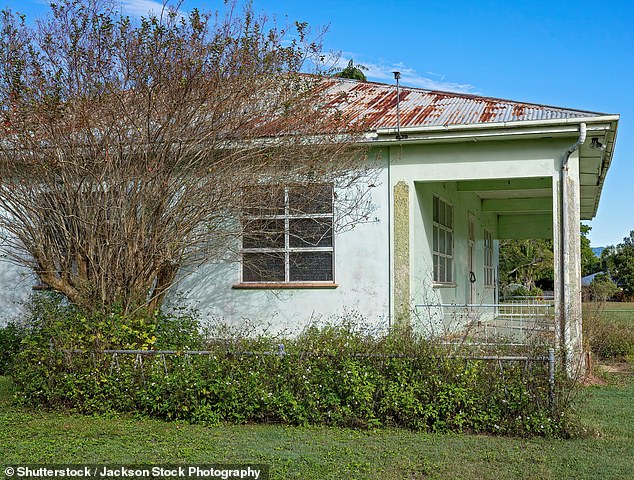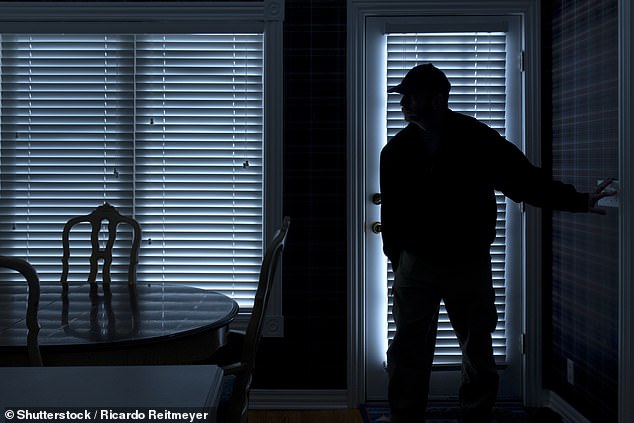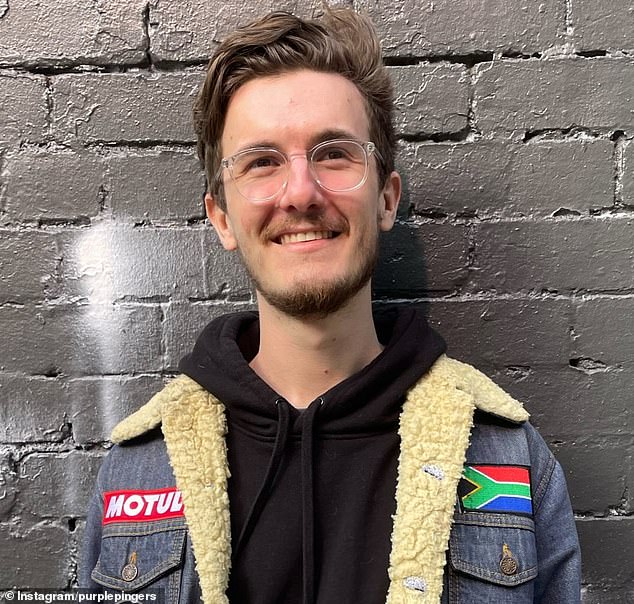A woman’s shocking discovery of squatters in her father’s home has sparked a debate over home ownership in Australia, with writer Clementine Ford defending the right of squatters to occupy unused property.
Carol, a Victorian woman, called ABC Melbourne Mornings to ask for advice on what she could do to evict the squatters.
“Something terrible happened to me over the weekend and I don’t know what to do,” Carol, from Westmeadows, in the northwest of the city, said on Tuesday.
‘I showed up at my dad’s house, which has been pretty much empty for the last 12 to 15 years, and my key didn’t work.
‘I have been caring for my mother for the past 12 years and before that I was renovating the house. My mother passed away and I had not been home for nine weeks.
‘Someone broke in, changed all the locks, took absolutely everything in the house: furniture, clothes, personal items, toiletries, everything in the kitchen, everything in the garage.’
Carol became emotional as she said the items taken by the intruders included sentimental mementos of her late father.
“The police came, I proved I owned the house, they spoke to my neighbors who said, ‘Yes, it’s Carol’s house,’ and they called a locksmith who came in,” he said.
Writer Clementine Ford (pictured) has defended a squatter who moved into the home of a woman’s late father after it had been empty for nine weeks.

Carol said the squatters had changed the locks on her home and taken all her personal belongings, including those belonging to her late parents (file photo)
‘(The squatters) were not there, but they had brought in furniture: a refrigerator and a washing machine.
“…I don’t know who these people are.”
Attorney David Whiting recommended that Carol hire a security guard to challenge anyone who came onto the property and confront the occupants when they returned.
He also recommended that she “make an appointment” for the squatters to come back and remove all her belongings from the house and then change the locks.
Left-wing commentator Clementine Ford weighed in on the debate after hearing Carol’s story on the radio.
“I was listening to ABC and a woman called me with a ‘very distressing story,’ as she put it,” Ford wrote.
“I understand why she was upset, but the story also illustrates some of the enormous failures of rental rights in this country.”
Mrs. Ford sympathized with Carol’s pain, but disagreed that she wanted the squatters evicted.

The number of homeless people has increased in Australia and the number of older women seeking support services has increased by 40 per cent in the last decade (stock)
“I understand why someone who has lost both parents – and who has probably spent much of their adult life caring for them – would feel upset and violated when their affairs are interfered with in this way,” she said.
“But that’s the problem with the terrible rental market and the lack of rights for tenants here.”
The right of squatters to seize private property if it is unoccupied was spearheaded by Jordan van den Berg, better known by his social media handle ‘Purplepingers’.
Mr van den Berg encourages squatters to move into the empty properties he posts on his social media platforms.
Ms Ford said the commentator had done “an incredible job of exposing” the brutal reality of Australia’s rental market.
‘We’re all screwed as renters, even as absurd amounts of people compete to pay other people’s mortgages on moldy, overpriced slums, there are vacant houses all over the country being used as shelters for rarely-attended landlords or as tax loopholes.
“It’s disgusting. Why shouldn’t a house that has been practically empty for 15 years be used to house people?”
Ms Ford said property should not be seen as an investment but as a basic right, thereby reducing or eliminating the problem of homelessness, particularly among older women.

The “revolution” in Australia’s attitude to property has been spearheaded by far-left commentator Jordan “Purplepingers” van den Berg (pictured)
The government’s Specialist Homelessness Services Annual Report 2022-23 found there had been a dramatic increase in the number of older women seeking homelessness help over the past decade.
“The experience of homelessness has become increasingly common among older women, growing by almost 40 percent between 2011 and 2021 to reach around 7,300 older women,” she said.
‘While affordable housing shortages and an aging population have contributed to the increasing number of older people experiencing homelessness overall, lower lifetime incomes and savings are especially relevant to the homelessness experiences of many older women.
‘Since women are more likely to be absent from the labour market and return to paid employment on a part-time or casual basis, the amount of wealth accumulated is generally lower compared to that of men.’
Ms. Ford said she could be left without a stable home in her old age because of her inability to obtain a mortgage loan.
“The idea of investment properties is grotesque anyway, but in a country where tenants essentially have no rights, it’s disgusting that landlords are treated as if their ‘investment’ is not the same as any other kind of high-risk gamble,” he said.

Ms Ford (pictured) described the notion of investment and/or empty properties as “grotesque”.
‘I’ve been paying rent for 25 years, but since I don’t have a ‘stable’ job or any inheritance, I’ll probably never be able to buy my own home.
‘Even if one day she might have enough to get a down payment on a small apartment, what bank would give a loan to a woman in her late 50s with unreliable sources of income?
‘Meanwhile, how many other people have I helped buy houses and apartments so they can have their retirement plan?’
Ms Ford said Australia’s property market was in “crisis” and called for investors to face tougher laws to ensure no home was left empty.
“We have a homelessness crisis, especially among women over 65, but the government’s response to all this is to throw some stopgap policy solution at the wall and do absolutely nothing to curb the absurd rights given to property investors,” she said.
‘If you own multiple properties – and I mean two or more – you should be required by law to offer fixed-term leases with an option for longer-term leases of 10 years or more.’

